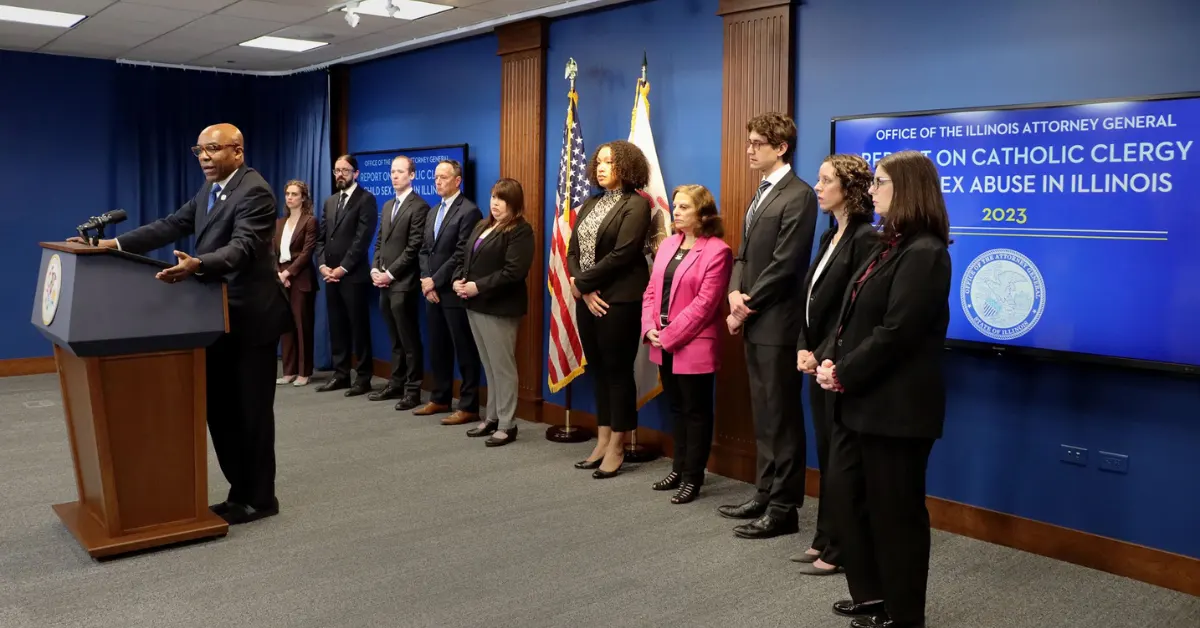Potential Lawsuits And Reforms Expected In Illinois Catholic Clergy Abuse Report
WESTERN SIDE OF CHICAGO — A nearly 700-page report detailing the conclusion of Illinois’ attorney general’s investigation into the s*xual abuse of children by Catholic clergy in the state found that the situation was much worse than the church recognized in 2018 when the state’s probe first began.
More than 450 Catholic clergy in Illinois s*xually molested nearly 2,000 children since 1950, Illinois Attorney General Kwame Raoul announced on Tuesday. However, Raoul and other specialists have said that the discovery is improbable to result in criminal prosecution.
That fits a pattern: neither the revelation of a blockbuster grand jury report on clergy abuse in Pennsylvania in 2018 nor the information on abuse in the Archdiocese of Baltimore last month resulted in an immediate rush of criminal indictments.
Proponents of the report said they hope it will encourage more victims to come forward to law enforcement, family, and friends. Others worry that it would encourage people to sue in civil court over historical mistreatment that occurred many years ago.

They want lawmakers to do more to make it possible to prosecute past occurrences of s*x abuse and to increase the severity of obligatory reporting.
“I’m proud of the attorney general and what he’s done, but there’s more we can all do together,” The Chicago chapter’s leader of the Survivors Network of those Abused by Priests, Larry Antonsen, said.
Raoul stated that any situations his office believed could warrant criminal charges were sent to local prosecutors, although he was unaware of any such charges having been brought.
Illinois attorney general finds Catholic clergy sexually abused nearly 2,000 kids, with hundreds more priests involved than the church had named. https://t.co/A0JoV5DDkJ
— The Associated Press (@AP) May 23, 2023
The attorney general’s report admits that Illinois’ limitation rules prevent the prosecution of nearly all clergy who assaulted children decades ago, even after considering recent improvements to the law.
Statutes that set time limits on when a suspect can be charged with a crime are put in place to protect justice and prevent problems like witnesses losing their memories or evidence being destroyed.
“Because the statute of limitations has frequently expired, many survivors of child sex abuse at the hands of Catholic clerics will never see justice in a legal sense,” the report said.
We recently talked about the details surrounding much news. For more information, check out the articles we’ve listed below!
- NAACP Releases Travel Advisory For Florida
- Mayor Eric Adams On Migrant Crisis: Nyc Bearing “Burden” Of “National Problem”
- Ex-Royal Marines Leader Commits Su*cide Following Replacement by Competitor and Devastating Marital Breakdown
The Illinois statute of limitations on child s*x abuse remained 20 years into the 21st century.
Lawmakers in this state have enacted a package of bills that, beginning on January 1, 2020, will remove all statutory limitations on child s*x assault; however, these changes will not apply retroactively to acts of abuse before 2020. Amendments were also made to the process of filing civil claims.
The 2015 case of former U.S. House Speaker Dennis Hastert drove the movement to overturn the statutes of limitations on child s*xual assault. Time ran out for prosecutors to accuse him of s*xually abusing young boys while he was their wrestling instructor decades ago, but they did press charges related to banking irregularities.
There are also logistical difficulties, even when older cases might be prosecutable. Many priests accused of abuse in the 1970s, 1980s, and 1990s have passed away. Many people who could provide supporting evidence are also missing.
As per the report, evidence files from a diocese, the backbone of any criminal case, are often embarrassingly insufficient, disorganized, and feature unreadable handwriting. The report notes that religious organizations rarely conduct investigations to bring criminal charges.
“Child sex abuse investigation files from all six dioceses sometimes reveal a bias in favor of protecting the institution over searching for truth,” if the report is to be believed.
As per David Clohessy, a former national director of a survivors network, there is minimal chance of criminal charges being brought against church officials who aided in concealing abuse.
“External forces have been and remain the only effective way to bring even a modicum of change we’ve seen,” he said, referring to the lack of enforcement of reforms to how churches handle such situations.
After 20 years of trying to convict Monsignor William Lynn of felony child endangerment in a Pennsylvania case against the church’s handling of abuse reports, he pled no contest to a lesser charge in December.
Lynn’s conviction in 2012 was overturned twice in the next decade, making him the first U.S. church official to face criminal charges.
However, a civil claim can be filed if a child in Illinois suffered s*xual abuse in 2014 or later. However, the laws that were in effect at the time of the abuse apply.
Lawyers with experience with civil litigation involving child s*x abuse say that victims may get justice by filing suit, even if the assault occurred too long ago to be covered by state statutes.
Chicago attorney Marc Pearlman, who deals with such matters frequently, has claimed that it is often possible to have the church pay for therapy or counseling. He said that clients would feel more comfortable opening up about their experiences after filing a lawsuit and would be more likely to receive sympathetic hearing testimony.
Another attorney who focuses on child s*x abuse cases, Michael Mertz, echoed the call for victims to seek legal counsel and determine whether or not their circumstances fall inside any exceptions to the statute of limitations.
“Illinois law currently allows victims of childhood sexual abuse to come forward where the church fraudulently concealed involvement in the abuse,” Mertz stated. “As this report shows, the church has been concealing the identities of hundreds of abusers.”
In comments released on Tuesday, leaders of various dioceses expressed their regret to victims and promised to make significant reforms to ensure claims are scrutinized.
Regardless of the statute of limitations, the Archdiocese of Chicago said in its statement that it will provide “care, compassion, and even compensation to all who come forward.”
It’s possible to file a claim for abuse that occurred years ago because of “lookback windows” established by some jurisdictions.
However, a 2009 ruling by the Illinois Supreme Court in a case involving three Catholic dioceses indicated that such a change would require a constitutional amendment. The lawsuit claimed that decades before, when the victim was only 14, a priest speaking at the school s*xually molested him.
Pearlman, however, argued that disclosing the Illinois probe may pave the way for a constitutional amendment to be pushed through the Illinois legislature and ultimately supported by voters.
“The way to make progress is to continue to make small and medium and big changes when we have the opportunity,” he says. “ Something like the reports in Pennsylvania, in Maryland, here in Illinois, it creates an opportunity.”


